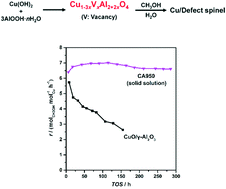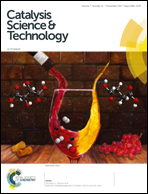Temperature dependence of Cu–Al spinel formation and its catalytic performance in methanol steam reforming†
Abstract
A series of Cu–Al spinel nanoparticles have been prepared by a green solid phase reaction method between 800 and 1200 °C. Characterization techniques show a strong temperature dependence of the textural and crystal properties, reduction behavior, and surface composition. It is illustrated that the prepared materials rich in Al were mixed spinel solid solutions having a surface Cu/Al ratio lower than the bulk. The samples have surface areas of 19.9–86.6 m2 g−1 with spinel crystallite sizes between 8.7 and 34.5 nm. The catalytic behavior of these spinel catalysts together with a reference Cu/γ-Al2O3 sample is studied in methanol steam reforming (MSR). By omitting the pre-reduction step, the Cu–Al spinel catalysts present an initial increase and then a gradual decrease of conversion rate with time on stream, which leads to enhanced catalytic performances compared to the conventionally adopted pre-reduction method. During the catalytic reaction, the catalyst is firstly activated in situ by non-spinel Cu2+ followed by the gradual release of more active Cu from the spinel structure. The in situ generated Cu species present high catalytic ability and simultaneously agglomerate to larger nanoparticles, which seem to be well stabilized by surface defect spinels rather than by γ-Al2O3. The sample obtained at 950 °C reveals the best catalytic performance, showing the highest activity and durability. In addition, several key points for a good spinel catalyst are proposed.



 Please wait while we load your content...
Please wait while we load your content...